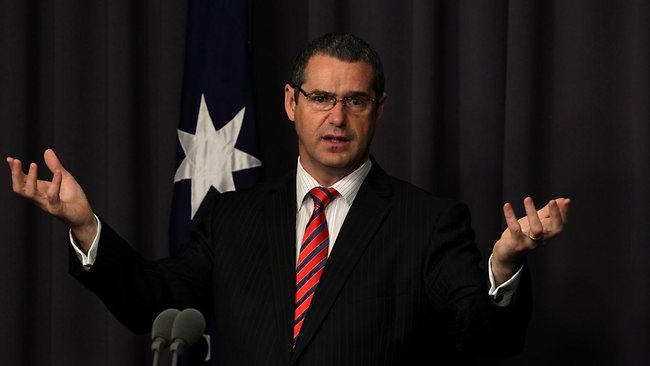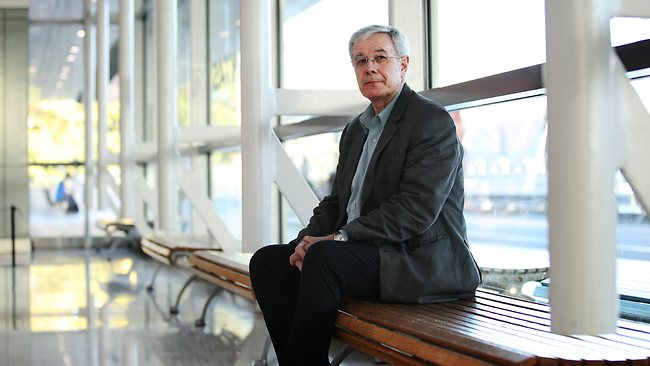Press tsar to regulate standards as publishers fume at media overhaul
LABOR has infuriated publishers by proposing a new federal regulator to oversee press standards and rule on mergers, as part of a wider overhaul.
LABOR has infuriated publishers by proposing a new federal regulator to oversee press standards and rule on mergers, as part of a wider overhaul to be rushed through parliament, despite fears it could trigger a $4 billion television takeover.
The reforms will establish a statutory authority to rule on the way the Australian Press Council and similar bodies adjudicate on complaints against the press, sparking furious warnings against the "unprecedented" intervention.
Communications Minister Stephen Conroy launched a high-stakes bid to legislate the curbs within 10 days using support from the Greens and independent MPs who have aired concerns in the past at the way the news media covered federal politics.
Opposition communications spokesman Malcolm Turnbull accused the minister of attempting to muzzle the press and declared a Coalition government would seek to rescind the laws.
Ending almost a year of deliberation, Senator Conroy gained cabinet and caucus approval to create a Public Interest Media Advocate to decide on takeovers, vet investors in major companies and approve press standards.
Details of the bill are yet to be revealed but observers said Labor was in a good position to push the change through by the end of next week.
Senator Conroy gained only conditional approval, however, for controversial changes to allow the big three free-to-air TV networks to buy regional stations, announcing a parliamentary inquiry rather than proceeding immediately.
The move could delay and possibly scuttle the government's aim of removing an existing rule that prevents any network from broadcasting to more than 75 per cent of the population.
Regional independent MPs are objecting to this change amid fears that local newsrooms could close if Nine Entertainment Co went ahead with its $4 billion merger plan with Southern Cross Media.
While Nine's chief executive, David Gyngell, sought to shore up support for this part of the reform in a lightning visit to Canberra yesterday, executives from Seven West Media and the Ten Network blasted the government package and saw no need to drop the 75 per cent rule.
Senator Conroy declared that the government "passionately" believed in freedom of the press but said the media had an obligation to the public, including timely responses to complaints and criticism. He said the Public Interest Media Advocate would not get involved in individual complaints against publishers but would ensure the industry "meets the standards that it sets for itself" at bodies such as the Australian Press Council.
"This is about trying to find a way that we bring together the legitimate concerns of the public, the legitimate concerns of the sector, so individual complaints are still dealt with in the same way," he said. "But if there's a breakdown in process, if it's not operating to the standards that it sets for itself, then the advocate is the judge of that."
Vowing to get the reform through by the end of next week, Senator Conroy said there had been months of public debate on media regulation and there was little point to another round of inquiries.
"The issues are known," he said. "People have been part of all of these processes. They have a chance to make submissions, but we're not going to be in a situation where we're being held hostage in the House of Representatives or the Senate.
"The parliament can decide whether it wants this bill or not."
Labor could push through the public interest test on ownership and the press oversight with support from the Greens and four independents, amid speculation that Rob Oakeshott, Tony Windsor, Craig Thomson and Peter Slipper could support the changes.
Mr Turnbull branded the reform plan a "chaotic, half-baked series of thought bubbles" and said the increasing diversity in digital media meant there was no need for the new ownership test or the oversight of the press.
"As far as this package is concerned, what Stephen Conroy is doing is responding to his outrage that the newspapers, particularly the News Limited newspapers, have seen fit to criticise the government and, indeed, him."
Mr Turnbull said appointing a government official to check on the press was a way to "bully the media" and a public interest test on ownership would also lead to political influence over the sector.
"I have no doubt that we would seek to repeal any sort of public interest test on media takeovers," he said.
The statutory press oversight would also be repealed.
"I do not see why there should be a government official, a public official, a bureaucrat no doubt, overseeing the Australian media," Mr Turnbull said.
"The press, now writ large courtesy of the internet, has always been free subject to the laws of defamation and contempt of court and so forth. And it should remain free. We should be enjoying more freedom, not less."
The new advocate would have the power to act against members of the Australian Press Council or other bodies that did not meet the right standards, recommending they lose an exemption from the Privacy Act that currently applied to journalists.
Media Entertainment and Arts Alliance federal secretary Christopher Warren said losing the exemption would make it impossible for journalists do to their jobs, reporting on matters that would otherwise breach the Privacy Act.
He said he could not see how the new regime was going to work and it had "more downside than upside" for journalists.
"Our view is that rights are rights and should not be determined by lining up with a quasi-governmental regulator," he said.
Seven West Media, which publishes The West Australian and has a self-regulatory regime to handle complaints, rejected the new regime, including the oversight of the press and the public interest test. "This is an unprecedented restriction that is wholly inconsistent with the notion of a free press," the company said.
"What Senator Conroy is proposing is in effect government regulation of the media."
The Ten Network rejected the public interest test and said oversight of the press was unnecessary, while News Limited, publisher of The Australian, called the government plan a retrograde step.
News Limited chief executive Kim Williams said there was more media diversity than ever and a "public interest tsar" would be beholden to the government to exert a political interest.
"This government will go down in history as the first Australian government outside of wartime to attack freedom of speech by seeking to introduce a regime which effectively institutes government sanctioned journalism," Mr Williams said.
While the Greens have criticised Senator Conroy's deadline to pass the changes and will not decide their position until seeing the detailed changes in coming days, they want a public interest test and stronger ways to oversee complaints against the press.
Greens communications spokesman Scott Ludlam said the media industry's warnings yesterday were "hyperbole".
"Let's have the press set their own standards but for heaven's sake, let's hold them to them. Otherwise why bother?" he said.
Senator Conroy's demand for a rapid vote in parliament was seen by some as proof of Labor's unease with the overall reform. "The minister doesn't feel he can hold his own side together in a seven-week break with this proposal in the field," said Senator Ludlam.
Parliament sits for two weeks and then breaks until the budget is delivered on May 14, leaving very few sitting weeks to decide any legislation before the election.





